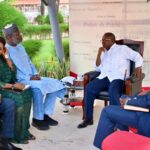IMF and World Bank Seal Strategic Pact with Niger Republic to Boost Economic Growth.
By Raymond Enoch
By Raymond Enoch
In a significant turn of events in management of the economy, Niger’s finance landscape is witnessing a transformative shift as the International Monetary Fund (IMF) and the World Bank intensify their support to the country in order to bolster the nation’s economic stability and growth.
Following a series of high-level meetings with Prime Minister Ali Mahaman Lamine Zeine, the IMF has agreed to disburse funds under its Extended Credit Facility (ECF) and Resilience and Sustainability Facility (RSF). These initiatives aim to foster inclusive and private sector-driven growth, with projections indicating a robust economic expansion of approximately 6.6% in 2025, primarily propelled by the burgeoning oil and agricultural sectors.
Concurrently, the World Bank delegation has underscored the importance of future collaboration focusing on critical sectors such as youth employment, health, and education. Their commitment to these areas aligns with Niger’s broader objectives of sustainable development and poverty reduction.
Despite these promising developments, Niger faces challenges stemming from substantial internal debt. Addressing this issue remains a priority for the government to ensure long-term fiscal health and economic resilience.
This renewed partnership between Niger and international financial institutions marks a pivotal moment in the nation’s journey toward economic recovery and sustainable development.









